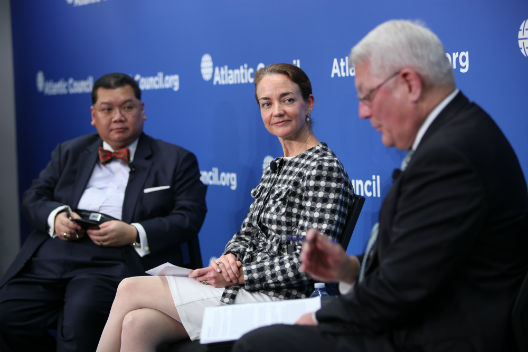On Tuesday, December 6, the Atlantic Council’s Africa Center, in coordination with the Brent Scowcroft Center’s Strategy Initiative, launched the latest Atlantic Council Strategy Paper, “A Measured US Strategy for the New Africa,” authored by Atlantic Council Vice President and Africa Center Director Dr. J. Peter Pham, with a foreword by General James L. Jones, Jr., USMC (Ret.), former National Security Advisor to President Barack Obama.
The report launched at an Atlantic Council panel discussion featuring Pham, Amanda J. Dory, deputy assistant secretary of defense for African affairs at the US Department of Defense, and GEN Carter F. Ham, USA (Ret.), former commander of US Africa Command.
In his overview of the report, Pham focused on Africa’s rising strategic importance to the United States and to the world as evidenced by both its burgeoning economic dynamism as well as the political and security challenges present there. As such, the incoming US administration would do well to prioritize engagement with African states and peoples.
Pham argues the next administration should focus on:
- Earned engagement: The United States should shift away from trying to pick the “right” winners in political disputes internal to African countries, and toward engaging those who prove themselves to be good bets. This approach puts the onus squarely on Africans themselves to create governance structures that are appropriate to their circumstances and whose legitimacy they accept, without prejudice from the United States or other outside actors.
- More realistic expectations: For much of the history of US engagement in Africa, the United States has operated with overly optimistic notions of what African partners are capable of and willing to do. That must change.
- Effective partners and partnerships: It is imperative that the United States develop “special” relationships with key African partners, as well as better coordinate strategy and operations on the continent with historical treaty allies like France and the United Kingdom.
- Flexible structures: US diplomatic and foreign aid structures are inefficient and ill adapted to meet today’s realities, and should be reformed as much as possible to reflect political, security, and economic realities on the continent.
Dory and Ham joined for a panel discussion covering the principles laid out in the report and how they might be practically implemented. A lively question and answer session followed, in which several members of the African diaspora raised issues with US policy toward Africa in general and specific countries in particular.
